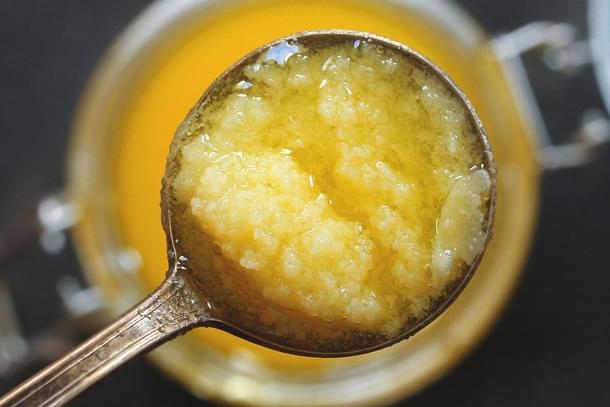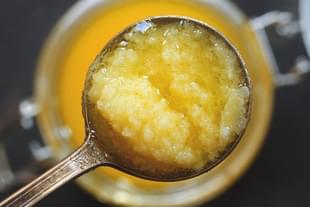Politics
Beef Fat In Tirumala Laddu: Eight Questions We Must Ask Amid The Outrage
Swarajya Staff
Sep 20, 2024, 05:08 PM | Updated Sep 21, 2024, 11:14 AM IST
Save & read from anywhere!
Bookmark stories for easy access on any device or the Swarajya app.


1. What is the quality assurance process in Tirumala?
We get some clues for the answer to this question from the Tirumala Tirupati Devasthanam's (TTD) response to the Karnataka Milk Federation (KMF) last year when the KMF publicly regretted not being able to reduce its prices to meet the TTD's demand.
At that time, in order to convey the message that the quality of the laddus will not be compromised, AV Dharma Reddy, Executive Officer of TTD, said that ghee suppliers must meet both quality and cost criteria before being awarded contracts for supplying ghee used in making laddus at the temple.
Reddy explained that all bidders must first pass a technical evaluation where experts conduct on-site inspections of each bidder's plant to assess their capabilities, including milk procurement processes, equipment, and other essential factors, before approving them for the contract.
"The procedure for procurement of any item by TTD is on a tender basis. We go for e-tenders. First technical bid and then financial bid," Reddy said.
As per another report, the TTD issues a tender to procure at least 1,400 tonnes of ghee, every six months.
That leads us to the next question.
2. Once a tender has been awarded, what is the process to ensure that quality criteria are being adhered to?
Here, it gets curious. As per this post from 2016 at news.tirumala.org, the TTD houses a 'state-of-the-art laboratory for biological tests of prasadam' (emphasis added).
Here is the opening paragraph of this post, once again with emphasis added: "The Health Wing of TTD, one of the major wings with over 448 permanent staff, over 2000 outsourcing staffs who work round the clock to keep Tirumala clean and hygienic. Apart from the regular cleaning and sanitation works, the department also handles yet another important function of testing, food, prasadam, and water samples and see that no adulteration takes place in the preparation of Annaprasada and laddu Prasada."
The post goes on:
"SOPHISTICATED LABORATORY
According to Dr Sermista, “Very few know that there was a massive effort behind the design to keep all prasadam drinking water, milk, Annaprasadam, Laddu Prasadam etc. being consumed and taken home as a token of Lord's blessings by lakhs devotees of Lord Venkateswara is free from all sorts of impurities. It is our mandate to ensure that belief and trust in Lord Venkateswara is not blemished even by very minute lapses. Every tray of Laddu, drinking water served as Jala prasadam and free meals given as Anna Prasadam to devotees is tested and certified on a regular and random basis every day without fail,” she said.
Meanwhile the food lab was set up in 1980 to check quality parameters of laddu and others as it took over seven weeks to get verification of supplies and finished products from the CFTRI labs at Mysore etc. What began as a small exercise in testing of food items has now developed into nerve center of TTDs major activity of prasadams for devotees, poor, and students at both Tirumala and Tirupati and become a role model institution on its own merits. We will soon begin micro-biological testing of water and other liquids provided by TTD to further ascertain that they are safe and healthy and fool proof, says Dr Shermita.
TEAM OF SEVEN ANALYSTS
With a team of seven qualified food analysts including a senior analyst, the Food Quality Analysis Lab is emerging as one of the role model institutions with state of art equipment to enhance the reputation and glory of Lord Venkateswara to ensure that all the divine prasadam given to devotees are both fungus and contamination free.
Smt M Sushma Ramana Reddy, the senior analyst at the Food Laboratory says that twice a day about 1000 Laddu trays are tested for quality parameters in quantity of condiments and also the quality of material used in laddu preparation areas as per standards set by the Dittam (traditional parameters). “Cashew nuts should be 23.5 gms, raisins to be 12.5 gms, almonds 8.2 gms and sugar candy -6.2 gms and moisture also should be 12% in each big laddu. Adding the above quantity only provides a shelf life of 5-7 days for the precious and holy prasadam to remain good for consumption. Where there is a lapse, we order the concerned tray and batch to be kept out of circulation till a full analysis is done”, she added.
The chief of Health Wing Dr Sermista says that the lab set up in 1980 has come a long way from just analysing 15 kitchen items to include almost 45 other commodities, liquids, powders etc. “The efficacy of our work is shown every day as we analyse all food items supplied in Anna prasadam complex, Vaikuntham queue complex, TTD run canteens in educational institutions, hospitals, guest houses across Tirumala and Tirupati’ she says.
MODERN GADGETS FOR TESTING
The TTD food lab was set up in the spacious complex opposite to Sri Varahaswamy guest house and it is equipped with all latest gadgets to analyse the quality of pulses, oils including ghee, water and also food items. “We have all testing tools for chemical and physical checking sugar, jaggery, milk, and buttermilk against adulteration, coloring and other impurities. ‘We check both tender samples and also supply samples of all spices, powders etc Dr Sermista said.
TTD has acquired a BR meter, Spectro Proto meters, muffle furnace for checking tamarind /jaggery. It has unique VV equipment for checking fiber content in pepper/ turmeric etc in the same manner water samples are taken from 30 locations in Tirumala and Tirupati daily at random places.
CLEANING OF POTU AND KITCHEN
Dr Shermista said “We get it cleaned every fortnight with traditional ingredients so as to not hurt the sentiments of the pious and also in line with the agama shastra Cleaning is done not only for potu floor but also the walls up to five feet to remove residues of all types once in a fortnight, she added.
Asked about the future road map of Food lab, Dr Sermista said the Food lab will soon take up micro-biological testing of liquids including water to further elevate the quality of food, water, buttermilk and milk items supplied to scores of devotees at Tirumala and patients, students and poor in Tirupati."
The content of this post leads us to the next obvious question.
3. If there is a laboratory precisely for testing prasadam at TTD, why did it not detect the animal fat all this while? Is the laboratory functioning as of today?
In the TTD's own words, they have a 'state-of-the-art' laboratory. Why did this laboratory not detect the animal fats in the product they are supposedly testing twice a day?
The complaints regarding the deterioration of the quality of the prasadam at Tirupati are not new. Did this lab look into it? If yes, what were its findings?
Lastly, it is also not out of place to ask this question given all that has happened — is this laboratory even functioning today?
4. Why can't the TTD maintain its own gaushala for ghee production?
The TTD is supposedly making a loss of Rs 200 crore every year in procuring the materials for the laddu and making them available to the devotees. If that is the case, why does the TTD not open its own gaushala to procure the ghee?
Religious and commercial establishments smaller than the TTD often take this approach when they require large quantities of dairy products daily.
5. Was the 'sample' that was sent for testing at the National Dairy Development Board in Gujarat the laddu or the ghee?
If it was the laddu, were the other laddus from this batch offered to Bhagwan Venkateswara and distributed among the devotees? If it was the ghee, was that batch of ghee used to make laddus? Which supplier gave the sample in question? Were samples from one more than supplier sent for testing?
6. Why has TTD not yet made a statement on the issue?
This is the biggest controversy involving the Tirumala temple in living memory. It has been forty-eight hours since the story broke, why have we not seen an official reaction from the TTD yet?
7. Will the investigation classify this as a case of 'food adulteration' or an issue of 'offending religious sensibilities' that threatens public order?
The gravity of the case far exceeds either of these concerns.
8. How can we be sure that the sweets we buy from the market aren't laced with animal fat?
It is not only in Tirupati where concerns about adulterated ghee arise. How can consumers be certain that the sweets they purchase from local vendors are not made with adulterated ghee? Moreover, how can we ensure the purity of ghee bought for home use? This raises the crucial question of verifying the quality and authenticity of ghee and other products in the market.





